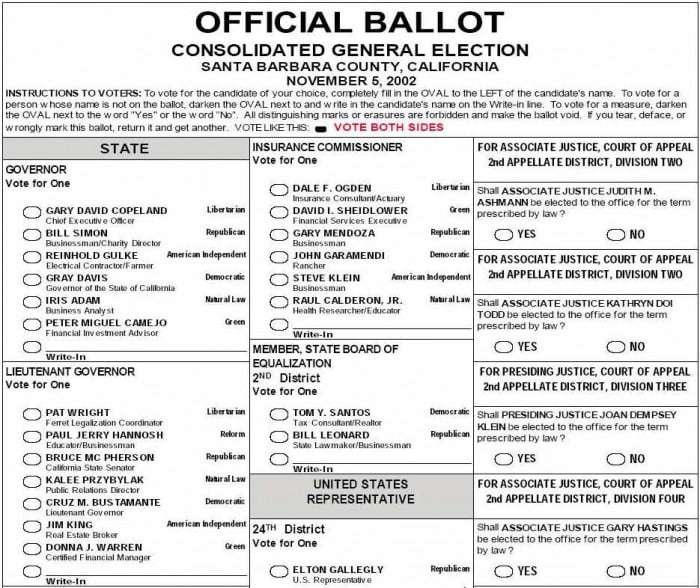The Volokh Conspiracy
Mostly law professors | Sometimes contrarian | Often libertarian | Always independent
A possible strategy for reducing voter ignorance about downballot races

Widespread voter ignorance is a major problem, with multiple dimensions. One of them is the sheer number of races on which Americans are expected to vote. Even if you have extensive knowledge about candidates for president, senator, or governor, you may know little or nothing about the people running for numerous lesser-known state and local offices, many of which still wield considerable power. You may also know very little about the issues those officials deal with. This article in Governing describes the BallotReady website, an interesting effort to increase voter knowledge about relatively obscure races:
When voters head to the polls, they're often confronted with a long list of downballot races they don't know anything about. Even moderately informed voters may find themselves staring blankly at names of candidates for school board seats, judgeships, neighborhood commissions and so on.
Some voters might make guesses or vote based on candidates' names. Others may choose to leave part of their ballot blank. It can be a frustrating process, leaving some voters to skip elections altogether.
One new startup aims to change that and bridge the gap of voter awareness of downballot races. BallotReady, which is affiliated with the University of Chicago, offers comprehensive nonpartisan voter guides on local elections in addition to state and national races….
A BallotReady user enters his street address and then is presented with a list of all the elections that will appear on his ballot, along with candidate names, biographies, endorsements and their views on prominent issues. A key feature allows for quick comparisons of candidates on issues ranging from gun control to the environment. Users save their list of selected candidates, which they can then print out or pull up on their smartphones when they go vote.
I think the BallotReady site is a potentially valuable innovation. But I am not as convinced as the author of the Governing article that it will make take more than a very modest bite of out of the problem of voter ignorance. There is already a large amount of information available online and elsewhere about numerous candidates, and their positions. The problem is not the supply of information, but the demand. Because of the very low likelihood that any one vote will affect electoral outcomes, most people find it rational to devote no more than a very small amount of time to seeking out and learning political information. This problem is exacerbated by the enormous size, scope, and complexity of modern government, which makes it likely that even relatively well-informed voters will know very little about more than a small faction of its activities, and the officials responsible for them.
Most voters have little incentive or motivation to try to cut through this confusion. Although it may be difficult for those of us who find politics interesting and exciting to understand, most people prefer to spend their time on other things. As former British Prime Minister Tony Blair put it, "The single hardest thing for a practising politician to understand is that most people, most of the time, don't give politics a first thought all day long. Or if they do, it is with a sigh…., before going back to worrying about the kids, the parents, the mortgage, the boss, their friends, their weight, their health, sex and rock 'n' roll…. For most normal people, politics is a distant, occasionally irritating fog."
BallotReady has the virtue of compiling information about candidates for many different offices in one place. But finding the site and going through them all still takes what, for many voters, will seem like considerable time and effort. I suspect that most of the people who take advantage of it are likely to be those who are already relatively well-informed and have an unusually high interest in politics. That would fit the pattern of most previous innovations that increased the availability of political information over the last few decades (summarized in my book on political ignorance). A number of other websites already make it possible to compare various candidates and parties on the issues, without - so far - noticeably increasing voter knowledge.
Finally, as I note in my critique of a different recent proposal to increase political knowledge, augmenting voters' knowledge of candidates' positions on issues without simultaneously improving public knowledge of the issues themselves may sometimes actually have negative effects, by making it harder for candidates to avoid adopting popular, but harmful policies.
Ultimately, I think the best strategy for reducing the problem of voter ignorance is reducing the knowledge burden of voters by cutting back on the size and complexity of government, and making more of our decisions in settings where we have better incentives to be informed. In the meantime, people who are unable or unwilling to to become even minimally informed about a given race or ballot initiative would do well to simply abstain from voting on it.
That said, the best should not be the enemy of the good. If BallotReady can modestly improve even a few voters' knowledge of of some races about which they would otherwise know very little, that is generally a good thing. Making the already relatively well-informed minority still more knowledgeable is still a good thing. The headline of the Governing article suggests that the new website "may be a solution" to the problem of political ignorance. That seems highly unlikely. But it might make cut into the problem at the margin, which is certainly worth trying.


Show Comments (0)